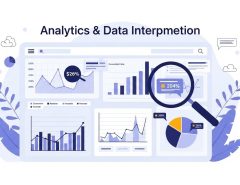There are so many different factors that go into the success of a website. And people often make the mistake of concentrating on one or two particular areas and completing neglecting other areas that are really important. To clarify, we don’t mean areas of the website, we mean areas that contribute towards the overall success of a website.
The kinds of things we are talking about are:
Performance
Having a slow loading website landing page or pages within your website is a big turn off for visitors. In fact, many users will leave a website if it takes more than a few seconds for a page to load. Having good performance comes down to a few different aspects but the web host itself will have a big influence on how well the website will perform. So if your website isn’t doing too well, you might want to look at moving to a new web host. You can use a performance testing tool to identify what the key issues are and then work out how best to resolve them. There may be issues that are simple to rectify, such as non-optimised images that are slowing down your pages.
Content
Obviously what you put onto your website is going to have a big impact on its effectiveness. Great content can make a huge difference in regards to whether someone takes your company seriously, whether they want to do business with you. Content sets your professional tone and tells people exactly what your business is and why they should choose you out of all companies.
Content also plays a big part in attracting internet users to your website when they perform a search. So making sure that your content is search engine optimised will help you to increase traffic to your website. The key to creating great content isn’t obvious but there are certain principles that will help you to ensure your content is of high quality:
- Error free
For a start, make sure that the information that you add to your website is accurate and up to date. Make sure that there are no spelling or grammar mistakes and thoroughly test all links to ensure none are broken. Perform regular audits to ensure that information is still relevant and correct.
- Useful and valuable to users
For people to want to view/read your content, it needs to be of relevance to them. You have to put the users at the centre of your content plans and create content that solves a problem for them or helps them in some way, or that entertains them. In other words, something that they actually want to read or watch!
- Attractive to look at
If your website looks a bit ugly or unprofessional then users are not going to be impressed. Using the right kind of images (and the right quality) plays a big part in the aesthetics of a website and can persuade users that your website is worth spending some time on.
Similarly, think about how attractive your pages look in terms of formatting and layout of text. Long pages of text are not very attractive and can put users off, so try and use formatting like bullets, headings and paragraphs to break up content. Using relevant images can also make a page of text look a bit more attractive to users.
Usability
Last but not least, having a website that is easy to use and easy to navigate around is imperative. If your website isn’t responsive then you could be causing mobile users a real headache, so make your website as easy to use as you possibly can.





Leave a Reply